Orr would explode the following season, scoring 33 goals and adding a whopping 87 assists to total 120 points, six short of the league record and become the first and only defenseman to lead the NHL in scoring, which would net him the Art Ross Trophy. Additionally, he was named the winner of the Hart Trophy as league MVP. The Bruins would advance through the playoffs, eventually winning the Stanley Cup in overtime of Game 4, a goal captured in an iconic photograph of Orr flying through the air like a superhero in celebration. Following the playoffs, he would be named the recipient of the Conn Smythe Trophy, making him the first player to win four major NHL awards in the same season.
Wednesday, December 21, 2011
1972-73 Boston Bruins Bobby Orr Jersey
Bobby Orr, a defneseman and considered by many to be the greatest player in the history of the NHL, was signed by the Boston Bruins at the age of 14. League rules at the time dictated that Orr could not play in the NHL until turning 18. Orr bided his time playing for the Oshawa Generals of the Ontario Hockey League and, in his final season in junior hockey, scored 94 points in 47 games,an average of two points per game, an unheard of average for a defenseman.
Orr, wearing #27 during his first NHL training camp
Orr had first came up to the Bruins in 1966, and simply revolutionized the position of defense with his end to end rushes and attacks, previously unheard of by players of his position. He benefitted from playing in Boston Garden, where the rink was 9 feet shorter than a standard rink, getting him from one end of the ice to the other that much faster.
He would win the Calder Trophy during his first season with the Bruins after scoring 41 points in 61 games. He would miss nine games late in the season with a knee injury, foreshadowing the injury problems that would plague his career. Prior to Orr's arrival, the Bruins had missed the playoffs for seven consecutive seasons and, while they would not make the post-season during Orr's rookie season, they would make the playoffs in every subsequent season of Orr's career in Boston.
Despite only playing in 46 games of the 1967-68 season, Orr would win the first of eight consecutive Norris Trophies. Back on track in 1968-69, he would play in 67 games and top 20 goals for the first time with 21 and total 64 points.
Orr would explode the following season, scoring 33 goals and adding a whopping 87 assists to total 120 points, six short of the league record and become the first and only defenseman to lead the NHL in scoring, which would net him the Art Ross Trophy. Additionally, he was named the winner of the Hart Trophy as league MVP. The Bruins would advance through the playoffs, eventually winning the Stanley Cup in overtime of Game 4, a goal captured in an iconic photograph of Orr flying through the air like a superhero in celebration. Following the playoffs, he would be named the recipient of the Conn Smythe Trophy, making him the first player to win four major NHL awards in the same season.
Orr would explode the following season, scoring 33 goals and adding a whopping 87 assists to total 120 points, six short of the league record and become the first and only defenseman to lead the NHL in scoring, which would net him the Art Ross Trophy. Additionally, he was named the winner of the Hart Trophy as league MVP. The Bruins would advance through the playoffs, eventually winning the Stanley Cup in overtime of Game 4, a goal captured in an iconic photograph of Orr flying through the air like a superhero in celebration. Following the playoffs, he would be named the recipient of the Conn Smythe Trophy, making him the first player to win four major NHL awards in the same season.
He would top that mark in 1970-71 with an astounding 139 points, still the all-time record for a defenseman nearly 40 years later. In comparison, the first modern offensive defenseman Doug Harvey's top offensive season was in 1956-57 when he scored 50 points on 6 goals and 44 assists and his highest ever goal total was merely 9 in 1957-58 in comparison to Orr's top season of 46 and five separate seasons of more than 30.
His 139 points included a league leading 102 assists, 26 more than the next closest player, and earned him a second place finish in the scoring race behind Bruin's teammate Phil Esposito while winning the Hart Trophy for the second time. Orr would record a plus-minus rating of +124 that season, an NHL record that still stands today.
After the Bruins Stanley Cup triumph at the conclusion of the 1971-72 season, Orr underwent knee surgery on June 6, removing several bits of cartilage and some bone spurs, causing him to miss the Summit Series with the Soviet Union in September. Once healed from the surgery, Orr was healthy enough to play in 63 games of the 1972-73 season, which included setting a new NHL record for career points by a defenseman on this date in 1972 with an assist in an 8-1 win over the Detroit Red Wings to give him 541 points in 423 games, passing Harvey's 540 points in 1,113 games.
Orr went on to surpass the 100 point mark for the fourth of six consecutive seasons with 29 goals and 72 assists for 101 points, finishing second in team scoring to Esposito. Orr would play in the NHL All-Star Game and would win the Norris Trophy for the sixth of eight times.
The Bruins would return to the finals in 1973-74 following a regular season in which Orr would score 32 goals and 90 assists for 122 points followed by another 18 points in 16 playoff games.
Orr in 1973-74
Orr would once again win the NHL scoring race in 1974-75, capturing the Ross Trophy for the second time after a career high 46 goals, becoming the first defenseman to ever score 40 goals, combined with 89 assists for 135 points. He would be named to the NHL First All-Star Team for the eighth consecutive season, win his eighth consecutive Norris Trophy, play in his seventh NHL All-Star Game and win his first Lester B. Pearson Award.
His multiple knee surgeries would catch up to him, limiting him to only 10 games of the 1975-76 season. While essentially playing on one knee, Orr would compete for Team Canada in the 1976 Canada Cup, earning rave reviews and being named tournament MVP in the last hurrah of his storied career.
A move to the Chicago Black Hawks followed for the next two seasons but he totaled just 26 games and 27 points in 1976-77 and 1978-79.
His final career totals are 657 games played, 270 goals and 645 assists for 915 points after ten seasons in Boston and the two in Chicago. At the time of his retirement, Orr was the leading defenseman in NHL history in goals, assists and points. The only players who have averaged more points per game than Orr are Wayne Gretzky, Mario Lemieux and Mike Bossy - all forwards.
Orr's speed, acceleration and creative offensive ability, combined with his toughness and defensive skills revolutionized the position of defense and changed the game forever. He also moved beyond the world of hockey, becoming a mainstream celebrity in the United States.
While we have given you a brief overview of the game-changing career of Bobby Orr, entire books are devoted to his career and the impact he had on the NHL, and we here at Third String Goalie recommend Searching for Bobby Orr.
Today's jersey is a 1972-73 Boston Bruins Bobby Orr jersey. This style Bruins jersey was first used by the Bruins for the 1967-68 season. It was the first black Bruins jersey worn by the team since 1965, as they had previously worn gold jerseys at home since 1957. 1972-73 would be the final season for this exact variety of jersey, as the following season it would change to a v-neck style without the lace up collar for one season followed by a brand new look for 1974-75.
While we could post 100 videos of Orr in action, but believe this one captures the dominance of Orr's game. Simply amazing what a complete player he was.
Labels:
Boston Bruins,
Orr Bobby
Subscribe to:
Post Comments (Atom)

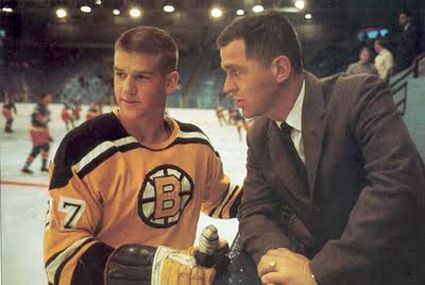
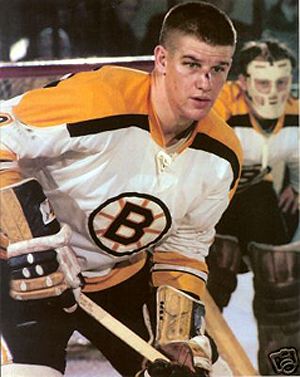
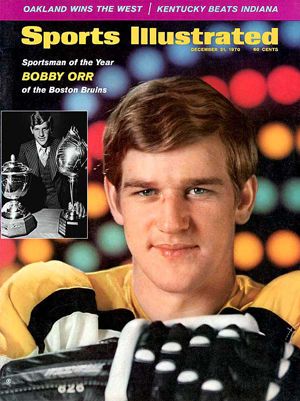
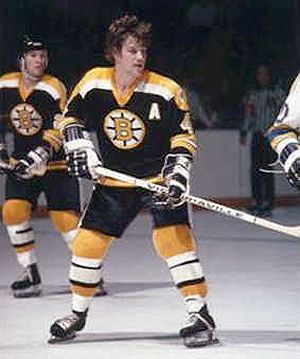
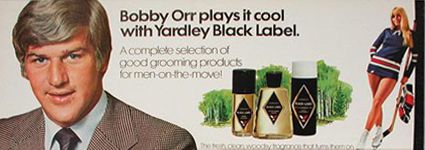
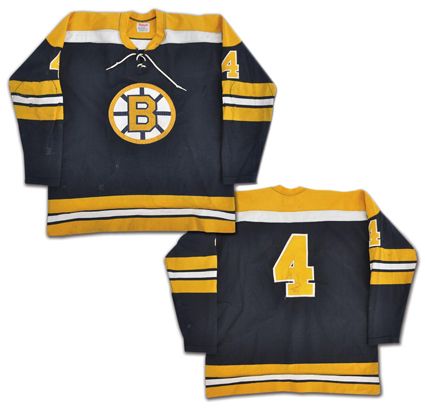










No comments:
Post a Comment
We welcome and encourage genuine comments and corrections from our readers. Please no spam. It will not be approved and never seen.